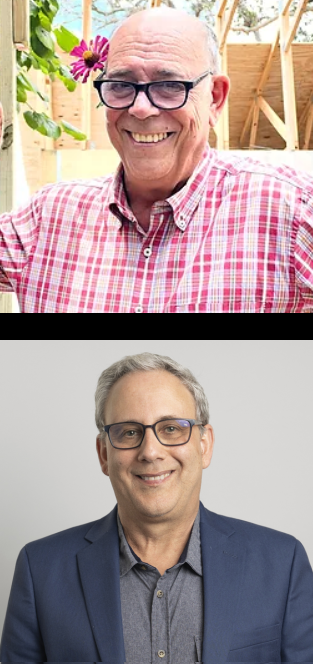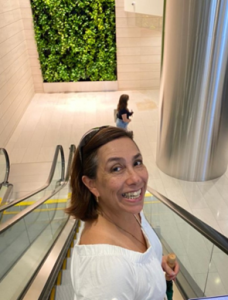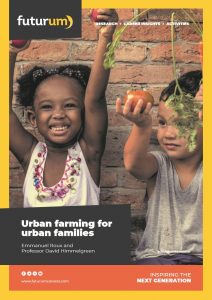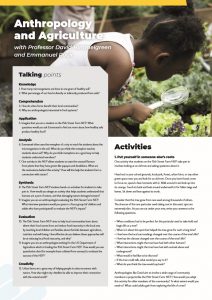Urban farming for urban families
Our well-being is intimately linked to the food that we eat and the places where it is grown. Healthy soils produce nutrient-dense food, which helps us stay healthy, both in body and in mind. For those of us who live in cities, it can be difficult to find fresh, good quality, local food. At 15th Street Farm in Florida, USA, Emmanuel Roux and Professor David Himmelgreen run an education project to help local families learn about their local food systems and make healthier food choices.
Talk like a farming and nutrition educator
Anthropology — the comparative and global study of humans, their biology, culture, material-remains and language in the past, present and future
Decomposition — the process of organic matter being broken down into simpler molecules, such as carbon dioxide, water, nutrients and nitrogen
Food security — having access to enough safe, nutritious and socially acceptable food for normal growth and development and an active, healthy life
Microorganism — any organism that can only be seen through a microscope such as bacteria, fungi and viruses
Nutrient cycling — the system that transfers energy and matter between the living and non-living parts of an environment
Urban farm — a green space within a city that is used to grow food and other crops and educate the public on the natural world
Have you ever stood barefoot in the mud and felt it squish and squelch between your toes; scrabbled around in the dirt and hunted for beetles, worms and slugs; or scooped up a handful of soil and let it fall through your fingers back to the ground?
The next time you are cleaning dirt out from underneath your fingernails, take a moment to consider the fact that one gram of healthy soil can contain up to 1 billion microorganisms. Incredibly, there are more microorganisms in one tablespoon of soil than there are human beings on the planet.
The soil in our fields is a bustling metropolis inhabited by bacteria, fungi and all sorts of other microorganisms. These microorganisms interact with each other in a complex network of relationships that underly many important processes, such as decomposition and nutrient cycling. As in a city, where people collaborate to keep society functioning, each organism in these communities has its own role to play to ensure that the soil stays healthy. The health of soil has a direct impact on the health of the plants and animals that live within it. For example, crop plants that grow in healthy soil are much more likely to be immune to diseases and able to flourish and produce plentiful, nutrient-rich harvests.
It is estimated that soils are responsible for producing 95% of the food that we eat, either directly, through growing crop plants, or indirectly, through growing plants that are fed to the animals that we eat. In this way, the health of soil determines the quality of the food that we eat, which in turn has a huge impact on our health and well-being; ‘we are what we eat’.
The connection between farming, nutrition and well-being can be seen on urban farms. These small-scale farms are found in cities all over the world and are important cultural resources. People living in cities can visit urban farms to learn about farming, purchase healthy, local food, and reconnect with the natural world that they are so often cut off from.
15th Street Farm in Florida is home to a nutrition education program (NEP) designed to reduce food insecurity in the local area by teaching local children and their families about their local food systems. The 15th Street Farm NEP is run by Emmanuel Roux, Director of 15th Street Farm, and Professor David Himmelgreen, Department of Anthropology and Director of the Center for the Advancement of Food Security and Healthy Communities at the University of South Florida. Emmanuel is a chef, restauranteur and urban farmer, and David is a professor of anthropology. Combined, their expertise brings people and communities together through an appreciation of nutritious food, farming and the natural world.
Who is the 15th Street Farm NEP designed for?
“The 15th Street Farm NEP is serving school-aged children and families who primarily live in marginalised communities,” explains David. Additionally, teachers from schools in the local area are being provided with tools, facilities and training to promote healthy food choices. “The goal,” continues David, “is to transfer knowledge and skills to reduce food insecurity and increase community involvement in developing local and regional food systems.”
What do students learn?
The 15th Street Farm NEP teaches its students about the links between agriculture, nutrition and wellness. “Soil and plant health are interconnected with human health and well-being,” says David. “This is critically important in light of modernisation and the disconnect between humans and the natural world.”
“We try to show our students that humans are very much a part of nature and not separate from it,” says Emmanuel. “Food does not come from the supermarket. Somebody has to prepare the soil, sow the seeds, grow the plants, harvest the produce and then distribute the food for us to enjoy.”
The NEP involves installing school gardens to enable children to see the connection between the natural world and the plants that provide us with food. This hands-on approach helps students develop an emotional attachment to food they have grown and to discover the taste of fresh, nutrient-dense vegetables. “We focus on ‘Good Food’, which we define as tasty, healthy, good for the body, and good for the environment,” says Emmanuel.
How does the 15th Street Farm NEP teach its students?
Emmanuel and David have developed novel educational approaches using simple metaphorical concepts (such as the soil as a city) and providing teachers with the teaching tools needed to apply learning in the garden to a variety of curriculum subjects. The outdoor learning results in greater student engagement and impacts human and environmental wellness.
For example, one activity asks students to look at an old tree and imagine its history. Students consider questions such as ‘how was it born?’, ‘what challenges did it overcome in its life to enable it to grow?’, ‘how has the environment changed during its lifetime?’ and ‘what interactions might it have had with animals and humans?’. These questions are designed to help students build an appreciation and reverence for the plants they see around them and to imagine the world from the plants’ point of view.
Reference
https://doi.org/10.33424/FUTURUM430
Another activity aims to expand students’ taste buds by encouraging them to grow, harvest, eat and share unfamiliar plants. “We grow unusual plants that offer a very contrasted range of tastes, from French sorrel to dandelion, from nasturtiums to strawberries and papayas,” explains Emmanuel. “We have developed an age-appropriate, hands-on curriculum to stimulate children’s curiosity and passion for gardening, nurturing plants, and eating food that looks beautiful, tastes good and is beneficial for their health and the environment’s well-being,” says David.
What challenges has the NEP faced?
Emmanuel and David wanted to interact with children and young people from a variety of age groups. This made it difficult to design a curriculum and appropriate activities for all ages. To overcome this, they made the NEP dynamic and flexible so that it could be adapted depending on the age and interests of the students taking part.
Another challenge was getting the support and buy-in from local teachers. Teachers in the area are already overworked and often receive little praise or appreciation for their work. Emmanuel and David have worked hard to ensure that teachers taking part in the NEP are provided with the support they need, in the form of information and school garden maintenance.
What are the next steps for the 15th Street Farm NEP?
“We are currently writing a progress report on the first year of the NEP for the USDA,” says David. “In the NEP’s second year, we plan on increasing the number of schools participating in the programme.” David and Emmanuel will also conduct a photo-voice project in which students will take photos of their time at 15th Street Farm and the school gardens. These photos will form an exhibition, highlighting the benefits the NEP has on families in the local community.
Emmanuel and David plan to look for grant opportunities to help fund the project beyond 2024, to continue working with the local community. David and Emmanuel hope that the impacts of the NEP will live on for years to come.
 Emmanuel Roux
Emmanuel Roux
Director and Program Developer, 15th Street Farm, St. Petersburg, Florida, USA
Fields of research: Urban Farming, Farming and Nutrition Education, Agritourism
Professor David Himmelgreen
Department of Anthropology and Director at the Center for the Advancement of Food Security and Healthy Communities, University of South Florida, USA
Fields of research: Anthropology, Nutritional Anthropology
Research project: The 15th Street Farm nutrition education program (NEP)
Funder: US Department of Agriculture (USDA)
About anthropology
Anthropology is the study of human biology, behaviour, cultures, societies and languages. Some anthropologists focus their studies on the past, looking at the origins of human cultures and how they have developed since the evolution of our species. Other anthropologists focus on cultures that exist today, often helping them to tackle the challenges they face.
Meet David
I majored in anthropology and biology at university. I took courses with a biological anthropologist who inspired me to study how humans use biology and culture to adapt (or not) to stressful environments such as food scarcity, extreme temperatures, and common diseases. During graduate school, I did field work in rural India and Lesotho among marginalised communities experiencing nutritional stress.
In the early 1990s, I was doing my doctoral research in Lesotho, Southern Africa. This was when South Africa was transitioning from the Apartheid system (based on racial segregation and run by an all-white government) to a democratic republic. It was both an exciting and challenging time to be in this part of the world.
More recently, I have been working with Feeding Tampa Bay and other local agencies to address food insecurity. In 2020, I founded the USF Center for the Advancement of Food Security and Healthy Communities which conducts research and programme evaluations, provides education on the long-term effects of food insecurity on health and well-being, and trains students to become the next generation of leaders addressing food insecurity.
Food is central to the human experience. People don’t just produce and eat food to survive, they also attribute meaning and values to food. Food brings people together but can also divide them. Food insecurity is a longstanding global problem that is tied to political, economic and social inequalities and inequities.
Projects like 15th Street Farm NEP can help towards tackling food security by providing knowledge, skills and agency to young people so that they will have a role in developing a food system where nutritionally adequate, safe and socially acceptable food is available and accessible.
I am proud to be training a new generation of students who are laser-focused on social justice.
Recently, I was elected as a Fellow of the American Association for the Advancement of Science for my “distinguished contributions to the field of anthropology, particularly for research and programmes mitigating global food insecurity, especially for marginalised populations, in relation to HIV/AIDS and nutritionally related diseases”.
David’s top tip
Be passionate and persistent in reaching your goals.
Pathway from school to anthropology
• A liberal arts education is essential for developing critical thinking and global citizenship, both of which will help you in your career as an anthropologist. The liberal arts consist of the natural sciences, like biology, ecology and neuroscience, formal sciences, like physics and maths, social sciences, and the humanities.
• Other skills that will help you become a successful anthropologist include research, writing and public speaking skills.
• Contact local universities or colleges to see whether they have any internship, work experience, or summer school opportunities in their anthropology departments. This is a great way to get practical experience and to assess whether anthropology is right for you.
• There are lots of anthropology volunteering programmes which allow you to travel abroad and support communities all around the world whilst simultaneously learning about anthropology.
Explore careers in anthropology
• Websites such as the American Anthropological Association, the Society for Applied Anthropology and the Royal Anthropological Institute are all great places to learn more about the field of anthropology.
• Anthropologists can use their expertise in a variety of areas, including academia and research, business and marketing, the charity sector, and even in government.
• Anthropologists can use their knowledge and expertise to help communities all over the world tackle their own unique challenges. An understanding of different customs, cultures and traditions allows anthropologists to engage with all sorts of different communities.
About agriculture
Agriculture is the process of nurturing soil and microorganisms, planting and harvesting crops, and raising livestock. The agricultural revolution took place over 10,000 years ago and was a major step in the development of human culture and civilisation. Since then, humans have been reliant on farming for almost all our food. Chemical farming has damaged the environment, including soil. New organic methods aligned with natural systems are being implemented and will reduce the negative impacts of chemical overuse.
As weather patterns continue to be affected by climate change, farmers all over the world are having to adapt their practices to produce enough food. Farmers are benefitting from a greater understanding of soil microbiology and new technologies to make their farms more efficient. Some are turning to regenerative agriculture techniques and practices such as agroforestry (growing crops or raising livestock in forests).
International conflicts, like the war in Ukraine, and disruptions to global supply chains, like those caused by the COVID-19 pandemic, have made global food distribution more difficult. Agricultural science can help farmers improve their practices and produce larger amounts of high quality, nutritional food, relieving some of the pressure on supply chains and protecting global food security.
Meet Emmanuel
Growing up on a farm created a connection with the natural world and an intimate understanding of agricultural crop production, transformation and cooking – and the sharing of the end result.
Running your own restaurant is very demanding and always unpredictable, requiring diplomacy and creativity. However, the rewards are the immediacy of customers’ feedback and the pleasure of creating and serving good food.
I was influenced by my uncle, Dr Jacques Bas, a French gastroenterologist (someone who studies the digestive system). He was a very early pioneer and discoverer of the importance of gut and soil microbiomes and a pioneer of organic agriculture in the mid-20th century in France.
I am passionate about urban agriculture because food and urban food production is a strong community binder.
I am proud of being able to share knowledge about natural systems, to illustrate the connection between soil microbiome health and human wellness, and I love great dinner parties!
Emmanuel’s top tips
• Read books, wander and wonder in nature, get your hands in good soil with friends, nurture and grow life. It is grounding and a great antidote to excessive consumerism.
• Cultivate curiosity and share your knowledge. It is very satisfying.
• We are born into a house full of windows and doors to be opened to discover what is outside.
Pathway from school to agriculture
• Subjects like biology, chemistry, botany, environmental science and geography will set you up well to study agricultural science at college or university.
• Contact your local university and see if they offer agricultural science courses and any internship or work experience opportunities.
• Urban farms exist in cities all over the world. Take a visit to your local city farm and ask about any opportunities you could get involved with. It may have a volunteering programme you could take part in. If your school does not have one, propose to start and maintain one!
Explore careers in agriculture
• A career in agriculture does not necessarily mean being a farmer. With an agricultural science degree, you could become a soil scientist, plant breeder, agricultural consultant or forest and woodland manager.
• Emmanuel’s background is as a chef and restauranteur. His passion for growing, creating and enjoying food has shaped his career. An appreciation of food and farming could lead to many different career paths, including urban farming, hospitality and teaching.
• The Food and Agriculture Organisation website has lots of information for young people about regenerative farming, soil biodiversity and nutrition. For example, here is a collection of short stories about soil biodiversity.
• If you have access to a garden or an allotment, grow your own food and share it with friends and family. There is a huge range of videos on YouTube that can help you get started. Take a look at GrowVeg. Get started, put seeds in the ground, water and nurture them, they will grow.
The 15th Street Farm nutrition education programme (NEP) involves a range of people including anthropology students, educational instructors and teachers who all work alongside David and Emmanuel to inspire the young people and families who visit and learn at the farm.
Meet Marcela

Marcela Munoz Marin
Undergraduate student, Department of Anthropology, Colleges of Arts and Sciences, University of South Florida
Who or what inspired you to pursue anthropology?
With a background in psychology, I am interested in culture and how the human experience is shaped by the connection between individuals and culture.
What is your role on the 15th Street Farm NEP?
My role has been to contribute to organising the information and knowledge from Emmanuel, the programme’s director, and the instructors into the programme’s curriculum. Next semester, I will be going to the schools and participating in the evaluation of the programme and the curriculum.
Why is it important for children to be immersed in nature and the environment?
Children are growing up in concrete and with computers, away from nature. This experience is a way for them to learn to enjoy natural environments. Taking care of plants enables them to interact with the environment and their peers, experience a different routine and understand how to take care of themselves and others.
What impact have you seen the 15th Street Farm NEP have on children?
Children learn to enjoy being outside in the sun with nature, and they feel proud of their gardens and their plants. They discover different vegetables, fruits and flavours they are not used to having in their diets. They also gain an awareness of the relationship between health, nutrition and wellness.
What have been the highlights for you of your work on the 15th Street Farm NEP?
My favourite experiences and successes from this programme have been putting together the curriculum to make it accessible and comprehensible for children of all ages. Also, being able to see all the satisfaction the children get from being successful with their seedlings and trying new vegetables is very rewarding.
What are your proudest career achievements so far?
Being able to help people to become their better selves through education.
What are your ambitions for the future?
To follow my passion for education and facilitate the path of students and people to learn, grow and have fulfilling outcomes in their life.
Meet Damien

Damien White
Instructor, 15th Street Farm, St. Petersburg, Florida
How has your career path led you to the 15th Street Farm NEP?
Prior to moving from Boston to Florida in 2018, I worked in hospital pharmacy. I was ready for a career change and while exploring this, started a home garden. I learnt about growing my own food in Florida. What started as a hobby soon transitioned to a passion, which opened up an opportunity to work in a school garden. Now, my role on the NEP is as an instructor at several schools in the area.
What makes the NEP such an innovative learning programme?
The focus on regenerative farming, specifically the soil. Healthy soil is needed to grow healthy food!
What types of activities do you lead students through?
Garden tastings, growing fruits and vegetables, learning to read nutritional labels and always working on ways to improve the soil.
How do you see the children responding to the programmes you run at 15th Street Farm?
The smiles on the children’s faces as they run from the school into the garden that they themselves have been tending to for months says everything. Students love the opportunity to learn outside the classroom. Many students know about gardening science and are proud to show what they already know, especially when they get to apply it to a real-life situation in the garden.
What have been the key successes of the 15th Street Farm NEP, so far?
Kids at one school grow produce and some is given to a local food pantry, providing fresh food to local residents. Another achievement is when students ask for seeds and then later tell me they’ve started growing vegetables at home. That always puts a smile on my face.
What are the next steps for the programme?
We need irrigation due to dry spells that can last weeks and even months. Unfortunately, irrigation can be quite costly so we would like to drill a shallow well at each school we work with. Shallow wells would allow us to water the crops without paying to use city water.
Meet Funmi

Funmi Odumosu
Master’s student, Department of Anthropology, Colleges of Arts and Sciences, University of South Florida
I was a STEM major and had dreamt of becoming a physical therapist, but after graduation and working in healthcare for two years, I realised that our current healthcare system does not prioritise the full story of health inequity. I witnessed the power dynamics between insurance companies, providers and patients, as well as the consequences to patient health when policy implementation fails to consider people’s lives and experiences. I began to understand that these critical and unheard truths would not be recognised in healthcare without a holistic medical anthropological approach and decided to examine public health inequities from an anthropological lens.
I am project coordinator and evaluator on the 15th Street Farm NEP. I liaise between our community schools, local garden educators, and the university research team. Through curriculums lesson plans on topics such as seeds, insects, soil and biodiversity, I collect data via pre and post surveys of what the children have learnt. This helps me measure the overall success of the programme and consider ways we can improve teaching children the connections between soil, plant and human health.
Teaching the importance of healthy food, where it comes from and how to grow it stems from an appreciation of nature and the environment. When children are immersed in nature, an interconnected awareness is created that allows them to understand and care for living beings around them – from other human beings to the critters and plants of Earth.
The garden is a tremendous place of growth and learning for the children. The school garden requires teamwork, which the students display each time they step into it. They work together enthusiastically, planting and tending to the food of the garden, and are instilled with a sense of self-accomplishment when they finally harvest the food from the seeds they’ve sown. The garden is also a haven and healing space for them where they can wind down, connect with nature and experience learning outside of traditional classroom structures.
A key success for me was getting the children to try new foods! We see children go from being hesitant, to being curious and excited to try something new and expand their taste horizons. These are great moments for the children and the teachers.
My proudest career achievements have been being able to publish meaningful work that speaks to the truths of how health is impacted by structural power and systemic inequities. Bringing these truths to light, not only in academic formats but also in more accessible formats for the general population, creates conversations around solutions to health disparities and brings us closer to change.
I aim to engage both academia and the broader community in the fight for food sovereignty and health equity. After graduating from my current master’s programme, I aspire to get a master’s in public health and use a holistic approach to demonstrate how structural inequities pervade every aspect of health and well-being, including access to healthy foods. I hope to continue to do community-based work, around school gardens and the school curriculum.
Funmi’s top tip
To engage in food justice work, it’s important to work closely with and listen to the stories and truths of the residents of the community. They live there, they know what they need, what has worked and what won’t work. One of the most important things to remember as a community-based researcher is that everyone has their own experience and knowledge; our job is to give them a voice.
Do you have a question for David, Emmanuel, Marcela, Damien or Funmi?
Write it in the comments box below and David, Emmanuel, Marcela, Damien or Funmi will get back to you. (Remember, researchers are very busy people, so you may have to wait a few days.)








